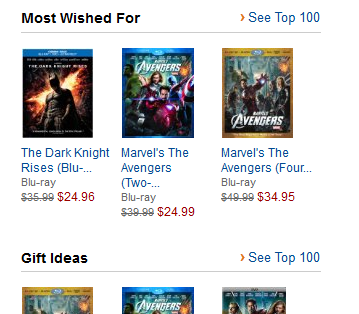Amazon Lies To Customer, Says Company Doesn’t Set Its Own Prices

An Amazon rep tried to claim that the e-tailer has no control over the prices it charges.
Consumerist reader David noticed that the DVD he recently purchased — directly from Amazon, not from a third-party — had dropped in price by $3. Knowing that many bricks-and-mortar retailers will honor the lowered price as long as it’s within a given period of time from the original purchase, David figured he would see if he could get Amazon to refund him the few dollars.
His first attempt got only a canned “no,” but he persisted and received a follow-up e-mail last week that his request was being “looked into.”
Then today, he receives the following message from someone in Amazon’s billing department:
I am really sorry we are not able to give you a price match refund. I know it is very frustrating when you purchase an item then the price drops right after. The same thing happened to me just the other day with a video game I purchased for my son for Christmas. Only it was a ten dollar difference. Still my answer was no as well.
Our prices fluctuate minute by minute and they are set by the manufacturer of the item, not by Amazon. So, we really do not have any control over what the price is going to be in five minutes from now.
If I made the exception for you right now I could lose my job. So, I’m sorry, my answer still has to be no. I know it is not fair and I wish we could make an exception for you, but then we would have to make an exception for everyone. So, the answer has to be no for everyone.
Thank you for your inquiry. Did I solve your problem?
Aside from the fact that David says he’s received price-match refunds from Amazon in the past — presumably without anyone being fired — this appears to be an outright lie on the part of the Amazon staffer.
Amazon, like any other retailer, buys items from manufacturers at wholesale and then marks up or down to suit its needs at any given moment. One notable exception to this are e-books, many of which are indeed priced per publishers’ orders. Of course, this is the subject of a major lawsuit involving the country’s largest publishers and Apple, and those books whose price is not set by Amazon come with the caveat that “This price was set by the publisher,” which we’ve never seen on a DVD listing.
And those prices that are set by the manufacturer or publisher rarely “fluctuate minute by minute,” as the Amazon billing rep claims.
“Despite their believing otherwise, I’m not a moron,” writes David. “With Amazon Sales Tax coming to my state next year, and the fact that this is the holiday season, with a LOT of competition out there right now, one would THINK customer service would be at the top of their priority list. As the price advantage dissapears, that’s all they’re gonna have going for them.”
We’ve written to Amazon asking for confirmation about its price-matching policy. If we hear back, we’ll update you.
If anyone out there actually works at Amazon and wants to — anonymously — provide your insight into this issue, shoot us an e-mail at tips@consumerist.com.
UPDATE: Consumerist reader and former Amazon employee D. writes in with some insights:
I was a phone CSA at Amazon during the 2011 holiday season, so their policies may have changed… Working at an American call center, we were given a lot of freedom when it came to price adjustments.If the adjustment was less than 10/15 bucks, we’d inform the customer that they could return the item, get a refund, and reorder it at the lower price. If they didn’t want to return the item, we would typically give them a promotional credit (like a gift card, but only usable on items “Shipped and Sold” by Amazon) for the amount of the price difference. This way, we weren’t really giving them money back, we were giving them a reason to buy more stuff.
For actual price adjustments [again, during the time at which D. was an Amazon employee’ things may have change], the policy was simple, but not public… To obtain a price adjustment, the order must fulfill 3 caveats: The item must have gone down at least 50 bucks. The item must have gone down in price within the last 14 days. The customer must ask for the price adjustment. If all those criteria were fulfilled, then we’d give the customer a refund back to the original payment method.
I also want to clarify to some readers who have written in: We are not saying Amazon should give David the price-match refund, or that the customer service rep who e-mailed David is lying about frequent price changes on the site. We are saying that the employee misled David about the reason for denying the refund.
With a handful of exceptions, Amazon determines the prices it places on the products it sells. Obviously those prices are based on the wholesale price they pay, but it’s generally up to Amazon to decide how much to charge. This is why Amazon continues to note those e-books with prices still determined by the publisher.
Want more consumer news? Visit our parent organization, Consumer Reports, for the latest on scams, recalls, and other consumer issues.

